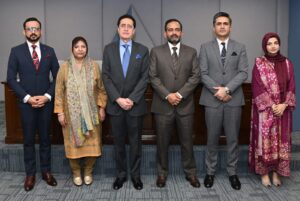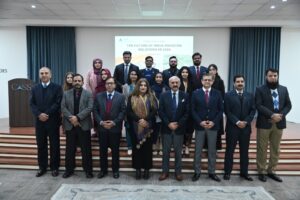Assessing Pakistan’s Economic Plan
Assessing Pakistan’s Economic Plan: Challenges and Opportunities for Sustainable Future

On November 23, the Centre for Aerospace and Security Studies (CASS), Lahore, hosted a seminar titled “Assessing Pakistan’s Economic Plan: Challenges and Opportunities for a Sustainable Future.” The event brought together a distinguished panel of experts, comprising eminent personalities with extensive experience in the public, private, development, and corporate sectors, and offered valuable insights and recommendations for shaping the sustainable economic future of Pakistan.
Dr Hafiz A Pasha, a renowned economist, discussed Pakistan’s economic plan during his keynote address. He emphasised on progressive and aggressive resource mobilisation. Moreover, he proposed equitable reforms for equitable growth to create opportunities for the 18 million idle youth in Pakistan to reduce the debt-to-revenue ratio. He suggested providing relief to poor population through direct taxation of specific sectors like property, agriculture, retail stores, etc.
Prof Dr Mumtaz Anwar Chaudhry, Dean of the Faculty of Business at Punjab University, pointed out that Pakistan lacks a long-term economic policy because policymaking is more party-centric or individual-centric and less state-centric. Furthermore, he underlined the crucial need to include industrialists, researchers, and academics in policymaking.
Dr Abiha Zahra, an Assistant Professor at ITU and author of a book on public sector reform, highlighted crucial reforms needed for economic resilience in Pakistan.
Mr Nadir Salar Qureshi, Engro Corporation’s CIO suggested that privatisation is an effective way to manage State-Owned Enterprises (SOEs) without burdening the government. He mentioned the success stories of other countries and apprised that Pakistan can also get similar results by privatising the power production, industrial, oil and gas sectors. He added that Privatising SSDC and SNGPL could bring in an estimated $500 million in revenue for Pakistan.
Ms. Maheen Rahman, CEO of InfraZamin, emphasized the importance of debt sustainability in shaping Pakistan’s future economy. To manage unsustainable debt, she suggested solutions such as taxation, investment-led growth, foreign direct investment, and people development. Ms. Maheen suggested that by focusing on small-scale enterprises, Pakistan can effectively reduce its debt-to-GDP ratio.
In his concluding remarks, President CASS Air Marshal Asim Suleiman (Retd) articulated, “There is no denying that the path to economic recovery is fraught with substantial challenges. However, within these challenges, there are unparalleled prospects for profound transformation.” He further added, “A strong sense of political commitment and ownership must underpin this endeavor.”


